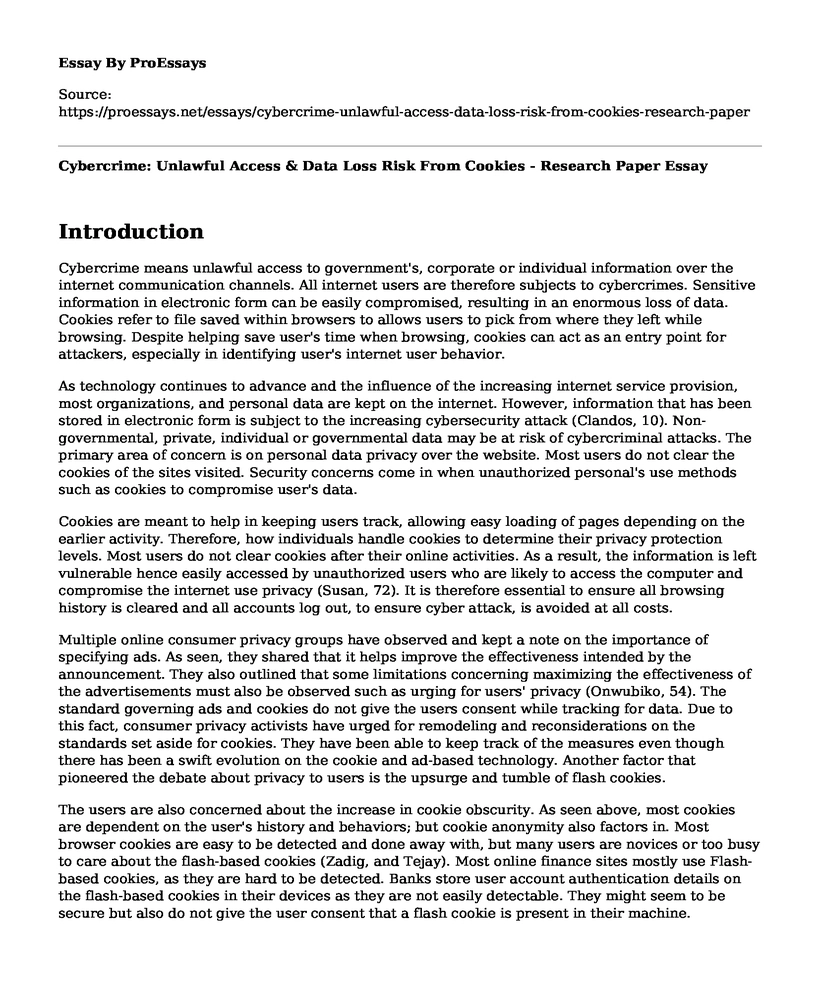Introduction
Cybercrime means unlawful access to government's, corporate or individual information over the internet communication channels. All internet users are therefore subjects to cybercrimes. Sensitive information in electronic form can be easily compromised, resulting in an enormous loss of data. Cookies refer to file saved within browsers to allows users to pick from where they left while browsing. Despite helping save user's time when browsing, cookies can act as an entry point for attackers, especially in identifying user's internet user behavior.
As technology continues to advance and the influence of the increasing internet service provision, most organizations, and personal data are kept on the internet. However, information that has been stored in electronic form is subject to the increasing cybersecurity attack (Clandos, 10). Non-governmental, private, individual or governmental data may be at risk of cybercriminal attacks. The primary area of concern is on personal data privacy over the website. Most users do not clear the cookies of the sites visited. Security concerns come in when unauthorized personal's use methods such as cookies to compromise user's data.
Cookies are meant to help in keeping users track, allowing easy loading of pages depending on the earlier activity. Therefore, how individuals handle cookies to determine their privacy protection levels. Most users do not clear cookies after their online activities. As a result, the information is left vulnerable hence easily accessed by unauthorized users who are likely to access the computer and compromise the internet use privacy (Susan, 72). It is therefore essential to ensure all browsing history is cleared and all accounts log out, to ensure cyber attack, is avoided at all costs.
Multiple online consumer privacy groups have observed and kept a note on the importance of specifying ads. As seen, they shared that it helps improve the effectiveness intended by the announcement. They also outlined that some limitations concerning maximizing the effectiveness of the advertisements must also be observed such as urging for users' privacy (Onwubiko, 54). The standard governing ads and cookies do not give the users consent while tracking for data. Due to this fact, consumer privacy activists have urged for remodeling and reconsiderations on the standards set aside for cookies. They have been able to keep track of the measures even though there has been a swift evolution on the cookie and ad-based technology. Another factor that pioneered the debate about privacy to users is the upsurge and tumble of flash cookies.
The users are also concerned about the increase in cookie obscurity. As seen above, most cookies are dependent on the user's history and behaviors; but cookie anonymity also factors in. Most browser cookies are easy to be detected and done away with, but many users are novices or too busy to care about the flash-based cookies (Zadig, and Tejay). Most online finance sites mostly use Flash-based cookies, as they are hard to be detected. Banks store user account authentication details on the flash-based cookies in their devices as they are not easily detectable. They might seem to be secure but also do not give the user consent that a flash cookie is present in their machine.
Cybercrime is a growing issue that needs user's attention. Despite browsers providing a faster way to keep browsing history for subsequent internet surfing, internet users should be aware of privacy compromise through cookies. It is therefore essential for internet users to ensure they precise cooking to safeguard personal privacy and avoid attacks from cybercriminals.
Works Cited
Clandos, R. "Eye on cybercrime." IEEE Security & Privacy, vol. 1, no. 4, 2003, pp. 10-11, doi:10.1109/msecp.2003.1219050.
Onwubiko, C. "Security operations centre: Situation awareness, threat intelligence and cybercrime." 2017 International Conference on Cyber Security And Protection Of Digital Services (Cyber Security), 2017, pp. 54-72, doi:10.1109/cybersecpods.2017.8074844.
Susan, S., and P. R. "undefined." Cyber Law, Privacy, and Security, 2019, pp. 52-72, doi:10.4018/978-1-5225-8897-9.ch004.
Zadig, S. M., and G. Tejay. "Emerging cybercrime trends." Investigating Cyber Law and Cyber Ethics, 2012, pp. 37-56, doi:10.4018/978-1-61350-132-0.ch003.
Cite this page
Cybercrime: Unlawful Access & Data Loss Risk From Cookies - Research Paper. (2023, May 06). Retrieved from https://proessays.net/essays/cybercrime-unlawful-access-data-loss-risk-from-cookies-research-paper
If you are the original author of this essay and no longer wish to have it published on the ProEssays website, please click below to request its removal:
- Case Investigation of Jack the Ripper: Research Paper Example
- Criminal Justice Industry Essay Example
- Contemporary Issues Criminal Justice System Essay
- Contracts Analysis of Damages Law-Suit and Mundo Manufacturers
- Mentally Ill Inmates Essay Example
- Essay on 3 Strategies to Prevent Violence: Hardening the Target, Blaming the Perpetrator, Blaming Society
- Essay Example on Border Patrol: Challenges of Protecting Borders in Crisis







